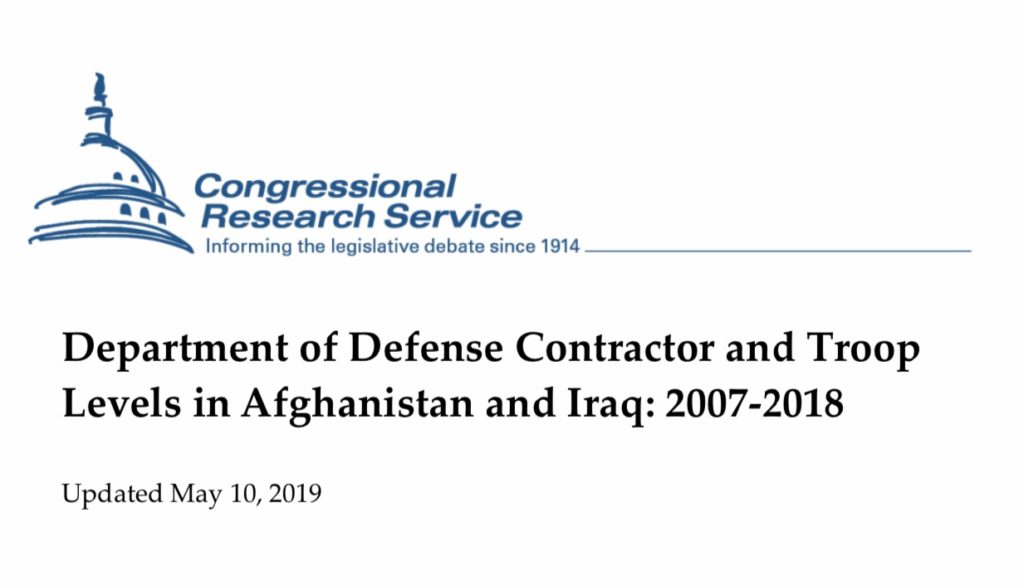 The Congressional Research Service recently published an updated report identifying the number of contractors employed in Afghanistan, Iraq, and Syria. The report, entitled Department of Defense Contractor and Troop Levels in Afghanistan and Iraq: 2007-2018, is available online through the following hyperlink: https://crsreports.congress.gov/product/pdf/R/R44116.
The Congressional Research Service recently published an updated report identifying the number of contractors employed in Afghanistan, Iraq, and Syria. The report, entitled Department of Defense Contractor and Troop Levels in Afghanistan and Iraq: 2007-2018, is available online through the following hyperlink: https://crsreports.congress.gov/product/pdf/R/R44116.
What is a Contractor?
The Code of Federal Regulations defines a defense contractor as “any individual, firm, corporation, partnership, or other legal non-federal entity that enters into a contract directly with the DOD to furnish services, supplies, or construction.” The report’s definition goes a step further:
Within the defense policy community, the term contractor is commonly used in two different contexts. The word can describe the private companies with which DOD contracts to obtain goods and services. It can also describe individuals hired by DOD – usually through private companies, which are also considered contractors in the previous context – to perform specific tests. The term contractor does not refer to military service members, civilian DOD career employees, or civilian political appointees.
This report uses contractor to describe individual contractors hired through DOD-funded contractors. These individuals may provide a wide range of services to the DOD, from transportation, construction, and base support, to intelligence analysis, translation, interpretation, and private security support.
How Many Contractors?
The report provides the number of contractors in Afghanistan, Iraq and Syria, and the U.S. Central Command (“CENTCOM”) as a whole:
- As of the fourth quarter of fiscal year 2018, 25,239 DOD contractor personnel were located in Afghanistan. Of the 25,239, 44% were U.S. citizens, 42% were third-country nationals, and 14% were local nationals. Roughly 9% of the 25,239 were employed as private security contractors.
- As of the fourth quarter of fiscal year 2018, there were 6,318 DOD contractors in Iraq and Syria. Of the 6,318, 49% of the DOD’s reported individual contractors were U.S. citizens, 38% were third-country nationals, and 13% were local/host-country nationals.
The number of contractors working in Afghanistan, Iraq, and Syria make up approximately 57% of the total number of CENTCOM contractors. As of the fourth quarter in fiscal year 2018, CENTCOM reported 49,451 contractor personnel working within its area of responsibility, includingThe CENTCOM area of responsibility spans 4 million square miles and includes Afghanistan, Egypt, Iran, Iraq, Jordan, Kazakhstan, Kuwait, Kyrgyzstan, Oman, Pakistan, Qatar, Saudi Arabia, Syria, Tajikistan, Turkmenistan, United Arab Emirates, Uzbekistan, and Yemen.
Defense Base Act Benefits:
More likely than not, each of these contractors is covered by the Defense Base Act (“DBA”). The DBA is a system of federal workers’ compensation that protects contractors who suffer work injuries. Pursuant to the DBA, which is an extension of the Longshore and Harbor Workers’ Compensation Act, employers and insurance carriers are liable for disability benefits and medical benefits. Disability benefits are paid to injured workers who cannot perform their pre-injury work because of their work injury. Medical benefits include any reasonable and necessary medical treatment related to the injury. Benefits are available to U.S. citizens, third-country nationals, and local nationals.
Strongpoint Law assists injured contractors all over the world in their pursuit of DBA benefits. If you or someone you know needs assistance, please contact us today.
